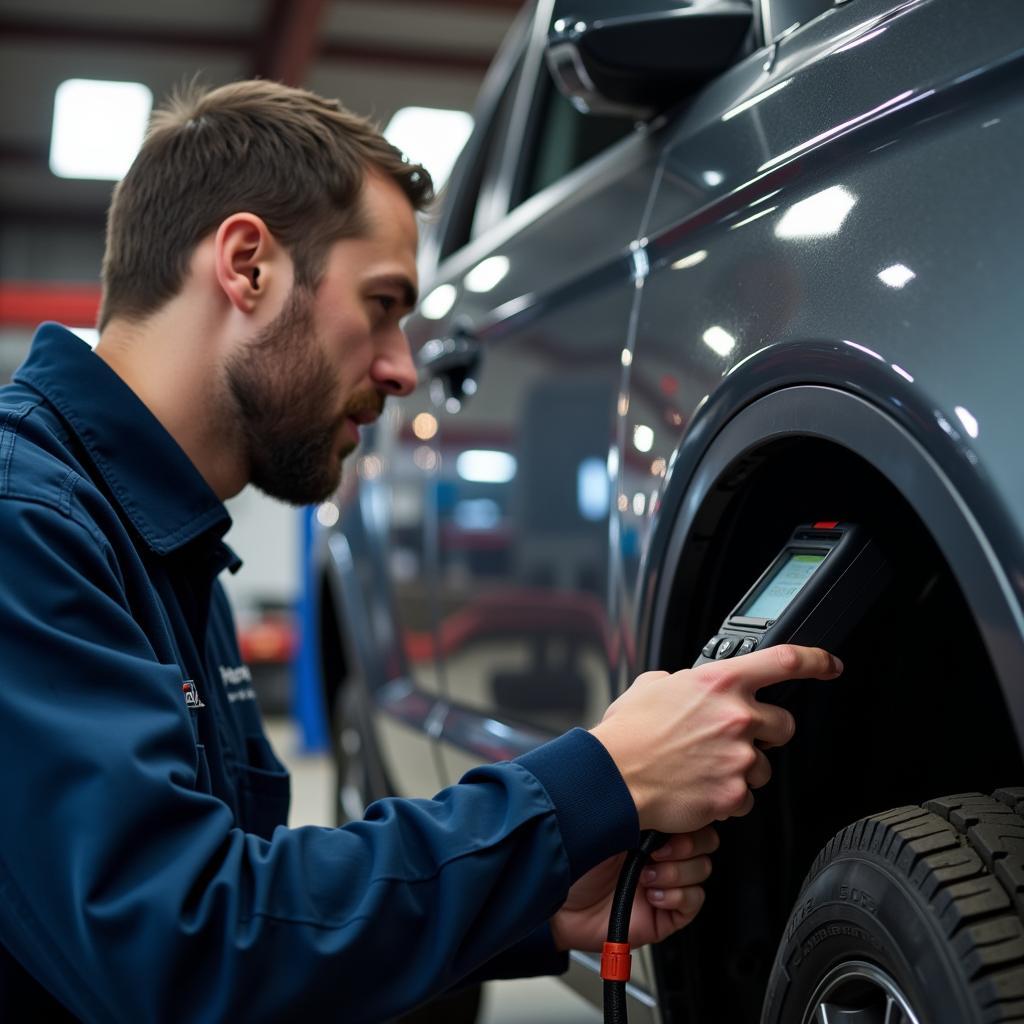Knowing whether that check engine light means a quick fix or a major headache is a question every car owner asks. A car diagnostic test is the first step in figuring out what’s wrong. But just how long does a diagnostic test take for a car?
While the answer isn’t always cut and dry, this article will delve into the factors that influence diagnostic test times, common issues, and provide insights to make your next trip to the mechanic a little less stressful.
Factors Affecting Car Diagnostic Test Duration
The time it takes to perform a car diagnostic test can vary significantly depending on a number of factors:
- Complexity of the Issue: A simple loose gas cap will be identified much faster than a complex electrical problem.
- Mechanic’s Skill and Experience: A seasoned mechanic can often diagnose problems quicker due to their experience with various car models and issues.
- Diagnostic Equipment: Advanced scanners can retrieve data faster and provide more detailed information, potentially speeding up the process.
- Vehicle Make and Model: Some vehicles have more complex systems that may require longer diagnostic procedures.
 Mechanic Using Diagnostic Equipment
Mechanic Using Diagnostic Equipment
Typical Diagnostic Test Times
While there are variables, here’s a general timeframe for car diagnostic tests:
- Basic Scan: A basic scan, which reads and displays error codes, usually takes 15 to 30 minutes. This is often enough for simple problems.
- In-Depth Diagnosis: If the issue is more complex, mechanics may need to conduct a more thorough diagnosis, involving visual inspections, component testing, and analysis of live data streams. This can take one to several hours.
What Does a Car Diagnostic Test Check For?
A car diagnostic test, using a specialized scanner plugged into your vehicle’s OBD-II port, can reveal a wealth of information about your car’s health. Here are some key areas it covers:
- Engine Performance: This includes monitoring sensors related to fuel/air mixture, ignition timing, and emissions.
- Transmission Function: The test checks for proper gear engagement, fluid pressure, and sensor readings within the transmission system.
- Brake System: It assesses the performance of ABS, electronic stability control, and other brake-related components.
- Emissions System: The test monitors components like the catalytic converter and oxygen sensors to ensure optimal emissions control.
Can Car Diagnostics Be Wrong?
While diagnostic tools are incredibly valuable, they aren’t foolproof. Sometimes, a diagnostic trouble code (DTC) might point to a symptom rather than the root cause. This is where the mechanic’s expertise becomes crucial. They’ll use their knowledge and experience to interpret the codes accurately, perform additional tests, and pinpoint the real problem.
Reducing Diagnostic Time and Costs
Here are some tips to potentially reduce diagnostic time and costs:
- Provide a Detailed History: Tell your mechanic about any unusual noises, smells, warning lights, or performance issues you’ve noticed.
- Regular Maintenance: Keeping up with routine maintenance, like oil changes and tune-ups, can prevent many issues and make diagnosis easier.
Conclusion
While it’s impossible to say exactly how long a diagnostic test will take for a car, understanding the factors involved can help you plan accordingly. Remember, a diagnostic test is an investment in getting to the root of your car troubles quickly and effectively, saving you potential headaches and costly repairs down the road.
FAQs
Q: Do I need a diagnostic test even if my check engine light is off?
A: It’s a good idea to get periodic diagnostic checks even without a warning light. This proactive approach can identify minor issues before they escalate into major problems.
Q: Can I perform a car diagnostic test myself?
A: Affordable OBD-II scanners are available for DIYers. However, keep in mind these tools provide basic information. For complex issues, it’s best to consult a qualified mechanic.
Q: How much does a car diagnostic test typically cost?
A: Diagnostic test costs can range from $50 to $150 on average. Contacting different repair shops in your area can help you find the best value.
Common Car Diagnostic Scenarios
Scenario 1: Your engine light comes on, and you notice a sudden drop in fuel economy.
- Possible causes: Faulty oxygen sensor, malfunctioning mass airflow sensor, issues with the catalytic converter.
- Expected diagnostic time: 30 minutes to 1 hour.
Scenario 2: Your car struggles to start, and you hear a clicking sound when you turn the key.
- Possible causes: Dying battery, failing starter motor, loose or corroded battery connections.
- Expected diagnostic time: 15 to 30 minutes.
Scenario 3: Your car vibrates excessively at high speeds, and the steering wheel shakes.
- Possible causes: Wheel alignment issues, unbalanced tires, worn-out suspension components.
- Expected diagnostic time: 30 minutes to 1 hour.
Need more information about car diagnostics? Check out these helpful resources:
- How long does a car ac diagnostic take
- What is a diagnostic test for car’s
- What does a car diagnostic check for
- Can car diagnostics be wrong
- How long does a car diagnostic test take
If you’re experiencing car trouble and need expert assistance, don’t hesitate to reach out to us. Contact our team of car diagnostic specialists via WhatsApp: +1(641)206-8880 or Email: [email protected]. We’re available 24/7 to answer your questions and provide top-notch support.

Leave a Reply